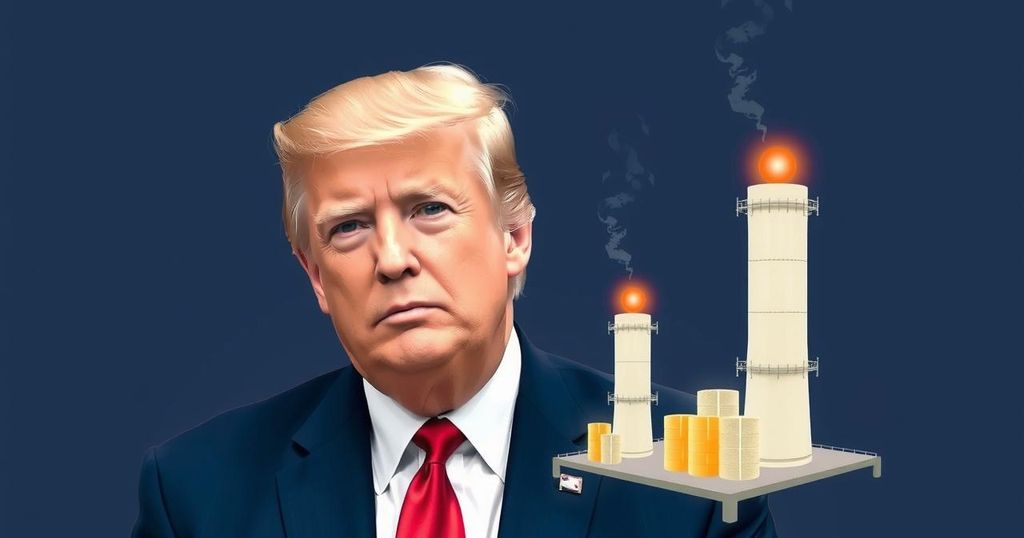Trump’s Energy Strategy: A Counter to Europe’s Energy Crisis

President-elect Donald Trump intends to declare a national energy emergency upon taking office, reversing current energy policies established by President Biden. His plan includes abolishing the electric vehicle mandate, enhancing traditional energy production, and lifting bans on natural gas exports to address an escalating energy crisis that threatens economic stability and job security for American citizens.
In a bold announcement, President-elect Donald Trump articulated plans to declare a national energy emergency upon assuming office, which includes the cessation of President Joe Biden’s energy restrictions. His proposed policy shifts encompass the abolishment of the electric vehicle mandate, termination of incentives for renewable energy, and lifting the natural gas export ban. This maneuver is crucial as the current administration has purportedly engendered an energy crisis that endangers both ordinary citizens and the country’s economic stability.
Trump emphatically seeks to alter the trajectory of America’s energy policies to prevent it from mirroring Europe’s struggles with climate regulations. The repercussions of such regulations are already evident in Europe, as industries grapple with adverse impacts leading to production declines, particularly in Germany where a projected 3% reduction is anticipated in 2024.
Moreover, fabrication industries, notably in Germany, face significant setbacks as climate policies have led to job losses driven by competition from cheaper Chinese electric vehicle imports. The Biden administration’s climate measures are perceived as counterproductive, disproportionately affecting American workers and exacerbating inflation by elevating energy prices and operational costs for small enterprises and farms.
Higher electricity prices are contributing to inflationary pressures on an already strained economy, risking the impoverishment of American citizens while inadvertently enriching China due to a focus on expensive renewable resources without significant global emissions reductions. The impending regulations set forth by the Environmental Protection Agency mandate that 70% of new car sales by 2032 be either battery-powered or hybrid models, straining consumer affordability as electric vehicles command much higher prices.
Furthermore, there exists growing dissatisfaction among automakers who are confronted with stringent regulations from California, pressuring them to abandon gasoline-powered vehicles in favor of hybrids or electric alternatives by 2035. Such developments elevate vehicle prices across the board, causing a ripple effect in the broader automotive market thus aggravating inflation.
The recent spike in residential electricity costs— up 32% since January 2021 —underscores the complications posed by a transition towards renewable energy. States enforcing renewable energy mandates consistently report higher electricity prices, while those with no such requirements tend to have lower rates. Trump’s initiative to eliminate incentives for wind and solar power seeks to bolster traditional energy sources and expand natural gas exports, ultimately alleviating financial burdens on consumers.
Critics observe that the current administration’s climate solutions further impoverish Americans amid rising consumer costs, job outsourcing, and increasing energy bills, signaling an urgent need for a strategic overhaul in national energy policy.
The United States is currently confronting an energy crisis characterized by rising costs of electricity, transportation, and dwindling domestic industries, linked to the environmental policies pursued by the Biden administration. These policies align with global climate change initiatives, often resulting in stringent regulations that burden manufacturers and consumers alike. A significant aspect of the discussion revolves around energy independence, particularly concerning competitiveness with China, which is emerging as a formidable player in the electric vehicle market. As the economic impact of regulatory measures becomes increasingly apparent, there is a crucial need for re-evaluation and reform of the current energy strategy to prioritize national interests and economic stability.
In conclusion, President-elect Donald Trump’s proposed energy policies aim to rectify the complications stemming from the current administration’s approach to climate change. The plans to declare a national energy emergency reflect the urgency to protect American economic interests, enhance energy independence, and ensure affordable prices for consumers. By dismantling restrictive measures and promoting traditional energy sources, Trump positions his administration to foster a more resilient and economically viable energy sector that prioritizes American jobs and industries, thereby averting a potential energy disaster reminiscent of Europe’s recent struggles with climate policy.
Original Source: www.heritage.org




